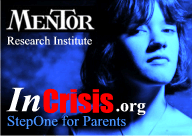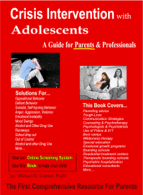By: Michael Conner, Psy.D Summary
More and more parents are searching for schools and intervention programs to help their children. They are doing this because public schools, community mental health, law enforcement and psychiatric services have failed. Out of shear desperation many parents search across the country and are investigating programs based on advertisements in magazines, television specials, the internet, newspaper articles and the recommendation of consultants. There are good reasons to investigate private schools and programs.
The stories provided by these parents are essentially the same with minor variations. Parents contact programs where a kind and confident person answers the phone. This person usually identifies their self as an admissions counselor or possibly the Director of Admissions. The qualifications of this person can range from a qualified licensed professional to someone who is unqualified with no training. In some cases the admissions counselor may have worked in other programs but not this one. Parents then talk about their child, the problems they are facing and their feelings which usually include fear, anger, sadness and even apathy. This kind empathic counselor listens until the parent begins to feel better. A bond of trust may be established based on this conversation alone. After a thoughtful and caring conversation, many parents will begin to feel there is hope. In most cases the program claims that it can help. At this point the structure and philosophy of the program has been discussed with someone who seems to care more about the parent's problems than police, school officials and even the child's counselor. Eventually the admission's counselor offers to fax or mail materials about their program as well as a list of parent references. Of course the list includes parents who have had children or currently have children in the program. Parents are then encouraged to call these parent references. Should parents contact parent references? What is the value of this information? In truth, there is some value in contacting former and current parents of children in a program. But it appears that the value is quite limited and probably misleading to most consumers. The Value of Parent References Bad References are Usually True. It is extremely rare that a program would refer prospective customers to a dissatisfied parent. But it does happen. This seems to occur because the program has lost touch with what parents are saying about the program. On the other hand, not all bad references are entirely bad. In fact they can give more credibility to a favorable comment that is also given about the program. Sometimes a bad reference is not so bad because it points out a limitation of the program while highlighting more strengths. But no program would give out the name of a parent who won a law suit against the program - even if the parent gave the program permission and asked. Programs do not release information about law suits and settlements because these agreements do not allow the parents to speak about the settlement. Good References are Usually Incomplete. It is fair to say that programs do not give parent references that would speak poorly of a program. Programs usually put parents on reference lists based on a screening and discussion within the program about what parents to include. Programs also monitor what the parents are telling people by checking back with people who are given parent references. In fact, programs do not offer references if those reference might speak poorly of other programs. As far as we can tell, all programs give parent references that are enthusiastic about their program. This would include parents who are not in touch or do not have a complete understanding of recent or past problems in a program. Some References are Corrupt. Believe it or not, there are many programs that pay parents or give parents a tuition discount for the recommendations provided it results in a new admission. There are parents who actively market their child's program as a means to pay for the program. Some of these people are self-proclaimed "educational consultants." You might be shocked to know that parents who are also professionals such a physicians may be given even higher financial incentives. Some References are in Denial. Some parents are so grateful for the help they have received that they will ignore concerns based on facts surrounding serious events. Far too many parents can ignore the fact that too many children in the program are being treated badly and are not benefiting - especially if they believe the program is helping their child. Moreover, the loyalty of most parents toward a program is higher if their child is enrolled, cannot come home and the child is in the middle of their program. This loyalty can become even more powerful if another parent's child is injured (or dies) in the program under allegations of neglect or abuse. Parents in these cases have reported that they are afraid the program will be closed or that they made a mistake sending their child there because they can't take him or her back yet. Some parents sympathize with a program and even report feeling as though they are being held "hostage" by the program under investigation. This identification is known as the "Stockholm Syndrome" where by hostages become supportive toward the very people holding them hostage. Under pressure of guilt, fear and no other option, some parents are ready and willing to believe the operators promise and assurance that the program really cares and that the program is the real victim of the authorities. In dramatic cases involving the death of a child, programs and parents have actually joined forces against authorities, other parents and the media. Such programs claim that that authorities don't really care about helping children, that parents are misguided or that the media is causing problems. What Parents Don't Say Matters Most It is not what parents tell you that matters. What parents don't tell you or don't know is what really matters most. Here are some cases examples. Some of the information has been changed. These are not examples regarding programs facing on-going litigation and criminal investigations. Any similarity to a specific program in trouble should be considered a coincidence.
Recommendations Parent references are worth calling but they really don't mean much. In fact they can be misleading, biased, corrupt and outright distortions of reality. Parent references are not reliable sources of information - especially if the program is likely to find out what was said and they can determine if the reference is not favorable. The only solution is to seek an independent and qualified recommendation. It is best to rely on professionals who have direct experience working with a program who are not paid by that program.
Copyright 2000 to 2011, Michael G. Conner |


